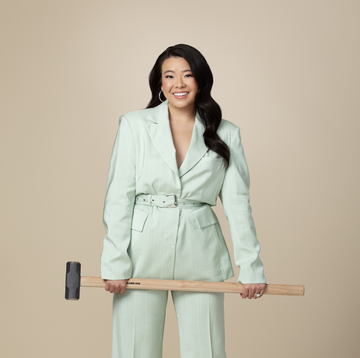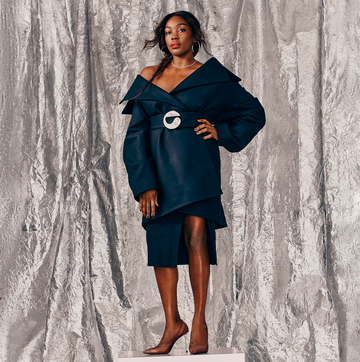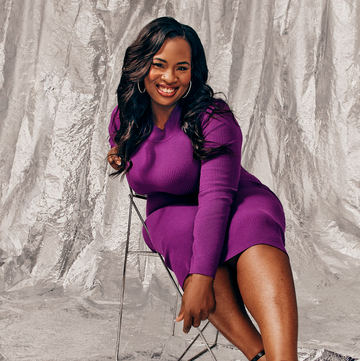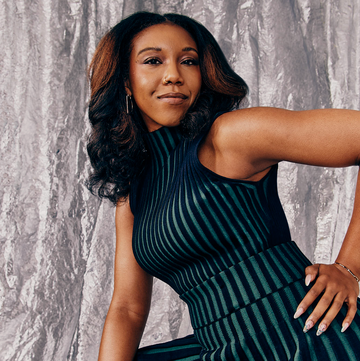Five years ago, Sara Smith, now 32, met the man she would marry while standing in line for tomato soup at a Chicago Au Bon Pain during a busy lunch hour. Smith worked for an investor-relations company and was about to start a graduate program in marketing, and the guy who got her number seemed just as ambitious. Jacob* was an attorney at a prestigious firm and had also clerked for a future Supreme Court Justice. By the end of the day, they'd set up their first date. By the end of a year, they were engaged.
Jacob seemed like the whole package: "Attractive, brilliant, and driven," Smith remembers thinking. Just before their wedding, though, he got laid off. At first, they saw a silver lining—they could go on a longer honeymoon, and Jacob could use his severance to buy time to find the right job. But after a few months, Smith started to wonder what the plan was. While she was slaving away in grad school, she wasn't even sure her new husband was bothering to shower.
"I'd come home and say, 'What did you do today?' and he'd tell me he caught up on The Daily Show and futzed around on the computer," Smith says. She tried to be patient while Jacob "figured things out," but, exhausted after a long day of seminars and assignments, sometimes her frustration would boil over. "He wasn't into cooking or taking on any of the household responsibilities. I'm such a doer, and I couldn't understand his mind-set at all." Her attempts at conversation were met with resistance. "I suggested that he volunteer, exercise, do something, but he was happy just hanging around the house. He kept saying, 'Something will come up,' but I got the sense he wasn't really looking."
Her friends also realized something was off. Out at dinner, Jacob had little to say in a group of dynamic people who were moving forward in their lives. Some thought Smith's Ivy League–educated husband was being lazy, while others reminded her that the economy was rough. When Jacob's severance ran out, his family gave him money to cover the rent, but finances weren't the issue for Smith.
"I wasn't with him because he had money," she explains. "I was with him because we shared goals and dreams. I didn't want a husband who hung out in his underwear watching TV all day and then expected me to cook dinner after work." The couple went to counseling, but nothing changed. No job, no plan, no help at home. Two years after they had clicked in the lunch line, Smith found herself in the midst of a divorce.
Sara Smith is one of many young women grappling with what some are calling the ambition gap. While Facebook COO Sheryl Sandberg has been encouraging women to amp it up professionally and Lean In, some men, it seems, are doing the opposite. It's a role reversal with implications ranging from how we date to what our family life will look like if we marry. According to a 2013 Pew Research Center analysis, a record 40 percent of all households with kids under 18 currently have breadwinner moms who provide all or most of the family income—a far cry from the mere 11 percent in 1960. Women now make up almost half the U.S. labor force, and 37 percent of married mothers have a higher income than their husbands. In fact, total income is higher in families where the woman is the primary breadwinner.
For single young women in the dating pool—specifically those who are unmarried, are city-dwelling, haven't had kids, and are under 30—the news is even more striking. In 147 out of 150 of America's biggest cities, median full-time salaries are 8 percent higher for these women than for their male peers. In some cities, like Atlanta and Memphis, the women are making nearly 20 percent more. Since the mid-1990s, single women have purchased homes at nearly twice the rate of single men, according to a recent report from the National Association of Realtors. And for all the talk of glass ceilings, not only are women at the helm of such major corporations as PepsiCo, Yahoo!, IBM, Xerox, Neiman Marcus, and Williams-Sonoma, but the Bureau of Labor Statistics has found that since 2010, women comprise more than half the workforce in highly paid managerial positions.
If this sounds like great progress, it's not without complications. As Hanna Rosin wrote in her much-buzzed about book, The End of Men (a title that not long ago would have been considered, at best, ironic), women are more highly educated than their male peers, earning not only 60 percent of all bachelor's degrees, but 60 percent of master's degrees, nearly 50 percent of medical and law degrees, and 42 percent of MBAs. In the new economy, where knowledge-based positions requiring more education are replacing manufacturing-sector jobs typically dominated by men, many women are entering uncharted dating territory, frustrated that they can't find an equal partner to share their lives with. "I spoke to hundreds of people, from high-earning women in Silicon Valley to low-earning women in small-town Alabama," says Rosin, "and regardless of geography or economic class, their relationships were being affected by this gap."
Meeting Your Match
Sarah Hague, a 31-year-old operations director at online design store Fab.com in New York City, says ambition or work issues have interfered with three of her major relationships. Right out of college, Hague signed up with Teach for America, a two-year-program that required long, intense hours. She started dating a go-with-the-flow guy who worked at a theater company where, she says, "he'd go into the office at 11, leave at 4:30, and spend most of the day chatting people up." He would complain about the lack of work but didn't seem to do much to explore other options.
The next guy she dated seemed more her equal: he was also doing Teach for America and was hardworking. Then Hague's stint ended and she took a job in a management role, while her boyfriend signed on as a public school teacher. Hague was fine with making significantly more money than he did, but he couldn't deal. Instead of supporting her success, he repeatedly told her that she had "sold out" and tried to get her to go back to "something altruistic."
Finally, Hague started dating an ambitious guy who worked in a different sector in her company. At last, she thought, her career wouldn't get in the way. The company financed her MBA, and things went well with her boyfriend until Hague got promoted… and he didn't. When he told her, "The only reason you got promoted is you're a woman," the relationship was over.
Now Hague isn't sure what kind of guy to look for. "I'm attracted to guys who are ambitious and successful, but there has to be room for my ambition too." Helen Fisher, an anthropologist and expert on gender roles, believes that after studying 40,000 people, she has found a biological explanation for why high-achieving women are having trouble finding compatible mates. "The kind of woman who's really rising in her career in her 20s tends to be high in testosterone," she said. "She often wants a high-testosterone man, but high-testosterone men are not always attracted to people who are like themselves. It's a biological problem on top of a social problem."
This jibes with what Amy Webb, author of Data, A Love Story, found when she posed as a man on online-dating sites to figure out what guys were looking for. Realizing that describing her impressive career as a digital strategist at the top of her profile was a buzzkill (not so for men's profiles, of course), she revised it and met her husband (who, once he met her offline, fell in love with "the ambitious workaholic that I am").
But Fisher is quick to point out that nobody has to settle. They just have to find a pairing that works well, which might mean going for a high-estrogen, rather than high-testosterone, partner. High-testosterone guys tend to be more aggressive, tough-minded, and competitive—and not as compassionate or emotionally expressive. High-estrogen guys, on the other hand, have no problem expressing their emotions and are trusting and empathetic but can be indecisive. As Fisher puts it, "The high-estrogen guy will be better at holding your hand if you're sick, but the high-testosterone guy will get the doctor out of bed in the middle of the night to do something about it."
When it comes to telling who's who, women should rely on personality traits, not stereotypes, Fisher says. "There are a lot of football players who are high-estrogen. President Obama is likely high-estrogen. He could have gotten a job with an exorbitant salary but instead worked in the poorest parts of Illinois helping people get washing machines. He calls his wife 'the boss.'" A high-estrogen guy may not be high-powered or make as much money, but "an ambitious woman could be very happy with a concert violinist or academic researcher, because he's passionate about and respected for his career choice," Fisher says. "And if she marries a guy like that, she could have a true partner in the domestic sphere who can help at home while she builds her career."
Indeed, according to a 2007 PEW study, in terms of factors deemed important for marital success, sharing household chores ranked higher than having "adequate income." And no wonder. Economists Marianne Bertrand, Claudia Goldin, and Lawrence Katz recently looked at the careers of MBAs over a period of 16 years and found that women with kids and a lower-earning husband made more money than women with husbands making more than $100,000 per year, possibly because they had the at-home support to succeed on the job.
Vetting the Beta Man
That's assuming, of course, that the guy is on board to share those household responsibilities and isn't threatened by your skyrocketing career.
Latrice Milton, 34, is a divorce attorney in Brookfield, Wisconsin, who learned the hard way that some beta men can be dead weight. Five years ago, she was dating "successful guys with huge egos" when she fell in love with, and eventually married, a friendly airplane pilot named Pete, who seemed as excited by his job as she was by her new position as an assistant district attorney. When he decided to leave his stable job with a major airline to fly more interesting planes at a startup, she didn't blink. "I wasn't looking for someone to take care of me," she explains, "I was looking for a partner. As long as he had a job he was happy in, I thought we'd both be happy in our careers and have a fun life together."
But as Milton began arguing prominent cases in court, writing speeches for senators, and appearing in local magazine articles, her husband, whose start-up failed and who was now unemployed, indulged in buying fancy computer software. Soon he had acquired a variety of new programs, including airplane-simulation and home-design software. "None of which he needed," says Milton, "I never expected I'd have to tell him to stay away from Best Buy." When she asked him not to spend money on expensive lunches, he told her she was being controlling.
One day, even after her husband had gotten a new job, Milton was in the middle of giving a presentation to senators about a bill she was working on when her cell phone rang. It was Pete calling from a car dealership. When she called back, he told her he'd bought a truck with their money—a surprise to her (his father cosigned the loan since Pete had been through a bankruptcy). After two years of these antics, she called it quits.
With that marriage behind her, Milton found a new calling—divorce law. "I was passionate about helping women like me," she says. "I thought, a lot of divorce attorneys aren't even divorced, but I've been through it. I can do this better." She also found a new boyfriend. This time she chose a hardworking MBA who is a good listener, cheers on her career achievements, and welcomes conversations about their long-terms goals. It seems like a perfect fit—his last relationship ended because his ex-girlfriend didn't want to work and he wasn't interested in financially supporting a partner either.
The New Normal
The rules around who makes what and does what in relationships are changing so rapidly, that Dawn DeLavallade, a physician in Florida, recently started an online community called SheMakesMore.com, to give people a forum to talk about what she calls the new normal.
She came up with the idea when, at the beach with some friends, they all realized that until that point, none of them had divulged the fact that they were the main breadwinners in their families. "There's a lot of shame and secrecy around this topic," she says. "We felt this huge sense of relief that we could bounce ideas off each other and openly discuss the challenges."
One such challenge, she says, is "the fear of emasculating your mate in the eyes of others." And then there's the private guilt. "In an effort to build up her husband and make him feel like the king of the castle, a female breadwinner might decide just to do the dishes herself rather than speak up and ask him to do what's essentially his Mr. Mom job. It can be a slippery slope for us, because we want him to feel like a man, but we also need those dishes done," she says. A recent study from the University of Chicago backs this up: It found that greater-earning wives compensate by doing more housework "so as to assuage the 'threatened' husband's unease"—and then often feel resentful.
Perhaps one day it will become a status symbol for an ambitious woman to have a stay-at-home or artsy spouse on her arm, but for now, there's still more uncertainty than pride. For women, finding a "catch" has traditionally meant marrying a good provider, and this notion has been slow to evolve in an era when, as Gloria Steinem presciently put it back in the 1970s, "We're becoming the men we wanted to marry." Even DeLavallade, who's happy with how she and her husband balance their careers, admits: "It's not the fairy tale you expected." But what makes it work, she believes, is discussing these issues in advance. "To the litany of questions we ask potential spouses early on, we need to add, 'If I do outearn you in our marriage, will you be able to handle that? And what will you be contributing to the household?' We never had to ask that before, but this is where we are, and it's not going to change. If anything, it's going to become even more common."
The more common it becomes, the more that people like Jill Cohen, a family mediator and attorney in Beverly Hills, see women coming in for prenuptial agreements. The discussions around these contracts outline not just financial arrangements but domestic ones as well, including who will take care of the home or the kids so the other partner can rise in the ranks at work. "There might be one person who's the higher earner, but the other spouse is a big part of enabling that success," Cohen says. "It's a dynamic that must be addressed or it can lead to tension."
For Lara Madison, a social worker in Watervliet, New York, her split at age 36 after eight years of marriage to a guy who spent more time playing fantasy sports than contributing to the household resulted in her paying her husband a large monetary settlement. And that was after having supported him throughout their marriage. "All I ever wanted was an equal partner," Madison says. "Once he stopped working full-time, the burden fell to me to do everything—cooking, cleaning, earning the income, paying the bills, home repairs. I was killing myself working two or three jobs just to keep us barely afloat."
Unsurprisingly, the disappointment killed their sex life. "Toward the end, it disintegrated like our relationship," Madison says. Latrice Milton, the divorce attorney, had a similar experience while supporting her husband. "Our sex life dwindled to nonexistent," she says. "I found his immaturity to be a big turn-off." Sara Smith, on the other hand, remembers that when things went south with her unemployed husband, Jacob, she was dying to have sex, partly to compensate for the loneliness she felt doing everything herself. But when she tried to be intimate, her husband worried that he couldn't satisfy her, because "he wasn't feeling like his best self," she says. Eventually, neither spouse wanted anything to do with the other. "He thought, 'My wife isn't being supportive of me and she's being a bitch,'?" says Smith, "and I thought, 'My husband isn't an equal partner,' so I didn't feel like doing it either." Soon she started daydreaming about other men… with jobs.
Alysha Baker, a 24-year-old restaurant manager in Los Angeles, says many of the guys she meets through friends or at bars lack drive. "It just seems like too many guys don't care what happens to them careerwise, which is kind of pathetic. If you aren't actively trying to make your career what you want it to be, I don't want to be a part of that. I may not meet all my goals, but at least I have them," she says. "So many guys I meet just want to make beats on their Macbooks and smoke weed." After dating a man who lived with his mother and wasn't taking any steps to move out, she has also learned to set boundaries early on in dating someone. "I'll take care of myself," she tells men she's seeing, "But if we get into a relationship, I don't want to need to take care of you."
Beyond the Double Standard
Interestingly, as women start setting more of the rules, could men be subjected to a double standard of their own? "Say a woman earns less but supports the husband's career by managing the house and watching kids—we understand that," says Jill Cohen, the mediator. "But if the man earns less and supports the woman's career in the same way, do we see the same value in that nonfinancial contribution, or does it seem like the husband isn't pulling his weight?"
She has a point. While househusbanding has become more accepted in theory, not all women are comfortable with it in practice. Steven, a writer in New York, took on "one hundred percent" of the domestic responsibilities—drop-offs and pickups, cooking, housework, grocery shopping—so that his wife, a literary agent, could rise to partner in her more lucrative career. But the arrangement caused tension. "She'd say, 'I work 10 hours a day,' and I'd say, 'I work 16, and half of those, I don't get paid for.'" They also disagreed about what they could afford. Steven says he's happy to lather up with a bar of soap, whereas his wife prefers fancy bath products. He describes their arguments like this: "She says, 'When we met, you said this was going to be a two-income family,' and I say, 'I make an income! Yours is bigger because I take care of the kids.' For all the men from the days of Mad Men, even the enlightened ones, not one would say the woman should watch the kids, clean the house, cook, and at the same time, make the same amount of money as the guy."
Stereotypical media messages about powerful women and beta guys don't help. We still see the alpha guys going for women whose main attribute is hotness (think Sophia Vergara on Modern Family), while the clever, ambitious women—Mindy Kaling's doctor on The Mindy Project, Rebel Wilson's successful attorney on Super Fun Night, Kerry Washington's communications strategist in Scandal, CIA officer Claire Danes on Homeland—are quirky nutcases or ballbusters who can't keep a boyfriend. Meanwhile, beta men don't come across much better, from the loser guys on New Girl to Breaking Bad's struggling teacher who moonlights at the car wash, only to turn into a meth dealer to supplement his income.
In the real world, single women are trying to figure out what to do with these men. Alysha Baker in L.A. says that when she was dating unambitious guys, she felt they had little to offer other than physical attraction. "It's totally not hot that this guy I dated lived with his mom. He wasn't boyfriend material—the sex was the only good thing." Sarah Hague, meanwhile, says that while she didn't mind having a fancier job than her exes, the tension in those relationships created emotional distance, which pretty much dampened any remaining desire.
As norms gradually change, though, women might consider the results of a 2010 study of business school graduates that asked "What is success to you?" Surprisingly, it was the women who chose "career goals." And the men? They picked "personal growth." Helen Fisher, the anthropologist, says this is good news: If women's roles expand, so do men's, giving them more latitude to "follow their bliss."
"What we're seeing now is called hypogamy," Fisher explains. "More men are opting out while their partners are climbing the ladder. The only catch is, when a man is not providing monetarily, he has got to be providing in some other way that the woman thinks is equivalent." In other words, it's about shifting our thinking and finding other advantages in a not-so-alpha guy.
Making It Work
Sarah Hague, who's dating again in New York City, is trying to adjust her filter. "Now I tend to rule out guys prematurely who don't seem ambitious before I can even get to the point of finding any other advantages," she admits.
But Jane Mathangani, a 39-year-old executive at Columbia Records who Lives in Montclair, New Jersey, believes that women should consider giving late bloomers a chance. When Mathangani met her husband, Eric, 10 years ago at a party, what followed was a whirlwind romance—with one major concern. At 27, Eric didn't have his finances together. He had defaulted on his student loans, had dismal credit, and rarely addressed his mail, which explained his overdue bills. Still, Mathangani saw potential in her boyfriend and, within two months of meeting him, took things into her own hands. He was, she felt, a talented but complacent art director who needed some organizational skills and a push to jump-start his career, so Mathangani asked if, using her background in promotions and operations, she could take over his finances and help him get ahead. If he had said no, she would have walked. "I wasn't willing to take the risk on a future that might not be what I wanted," she explains. "I told him, 'This won't work for me. I can't be with somebody who's going to bring me down.' If this guy was going to be the father of my child, I wanted him to learn how to live like a grown-up, so we could have the lifestyle we wanted and have a house one day."
Manthangani started handling Eric's bills and consolidated his loans. To restore his credit, she paid for everything with her money and had him pay her back with his checkbook—which she controlled. Meanwhile, using her advice, Eric began actively seeking out opportunities—then raises—at work.
"He started fighting for his career," Manthangani says. "He's super ambitious now. He used to be concerned just with the here-and-now. But now he thinks about me, our 4-year-old daughter, our future. He's a total go-getter." Eric also started a lucrative side company, boosting his income to be higher than his wife's. None of this would have happened, Mathangani believes, if Eric didn't want the same things she did. "A lot of women might think, 'It's never going to change; he's always going to be a loser,'" she says. "In my case, he wanted to be able to help provide a good life but wasn't there yet. Ultimately, though, he saw us doing great things together."
Staging an extreme makeover isn't the only way to bridge the ambition gap. Earlier this year, Susan Patton, a divorced Princeton graduate, made the rounds of talk shows—and became known as Princeton Mom—after she urged ambitious college women to look for men on campus because they'd likely share the same goals and drive. "To be with a mate who doesn't share those qualities is incredibly frustrating," she says. "I wish I'd married a Princeton man."
But Deb Ehrlich, who works in finance in L.A. (she asked us to change her name to protect her family's privacy), says that after 14 years of marriage, she appreciates "the intangibles" that her husband, who stays home, contributes to their life. In addition to shuttling their two kids to school and activities, patiently helping their son with his sixth-grade math homework, and coordinating their home renovations (although Ehrlich gets final say on the bathroom tile color), she loves that her kids have such a close relationship with their dad. Her husband is also a great advocate for her professionally and, most importantly, she says, "He is a sweet guy who is loyal, has a great heart, and would do anything for our family. I just happen to make the money."
Ehrlich's setup may sound thoroughly modern, but Helen Fisher says it's actually a throwback to, believe it or not, caveman times. "For the last 10,000 years, it has been man's role to provide," she says. "But before that, in hunter and gatherer societies, women provided the majority of the meals. They wanted a good hunter, but the man often came home empty-handed, so she provided most of the sustenance and women had equal economic power." This all changed on the farm, when men took produce to the market and came home with money. "Women went from the primary provider to the primary homemaker —their roles became subsidiary. Out of this came a lot of beliefs around what a man is and what a woman is."
What's exciting, Fisher says, is how these beliefs aren't just changing but coming full circle, allowing both men and women the choice to create whatever roles make them feel fulfilled. Lara Madison, the social worker who was married to the fantasy-sports buff, embraces this freedom. Three years into a happy relationship, Madison didn't go for the alpha guy this time. "I looked for a partner who was going to contribute on an equal basis," she said. "That will mean different things for different people. I just wanted to be with a guy who was one hundred percent committed to the future of the relationship. I think at the end of the day, no matter how much anybody makes, that's what we all want most—a true partnership."













